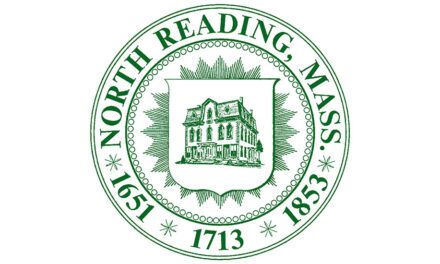Published in the April 12, 2018 edition
Updated from the print edition on April 22, 2018
By MAUREEN DOHERTY
NORTH READING — The mea culpa campaign worked.
Voters at Andover’s second Special Town Meeting successfully and overwhelmingly approved pursuit of the 99-year lease agreement with North Reading by a margin of 457-116 for the purchase of potable water into the 22nd century.
On April 4, Andover voters approved the same language previously approved by North Reading voters at October Town Meeting to authorize the Boards of Selectmen in both towns to seek a home rule petition with the state Legislature enabling the towns to enter into a 99-year lease agreement.
This vote is a virtual reversal of Andover’s previous Special Town Meeting on Jan. 29 when voters approved an amendment made on the floor of Town Meeting by a margin of 746-391 that approved the 99-year lease only if it included an exit clause after 20 years with five years’ notice by either town.
That amendment was a total deal breaker for North Reading, which has always maintained its desire for a permanent water source and long-term partnership with either Andover or the MWRA via a connection through Reading.
That message came through loud and clear to the Andover Board of Selectmen, Finance Committee and Town Manager as the town took the advice of North Reading’s Selectmen of the need to hold multiple public information forums to thoroughly explain all the details of the existing Inter-municipal Agreement between the two towns and the proposed agreement under a 99-years, as well as the documented economic benefits to Andover water customers based on the 44-year shared history of water sales between the two towns.
Multiple well-attended public forums were hosted by Andover officials who were joined by North Reading Water Superintendent Mark Clark to answer technical questions. Clark has held this position for 27 years and during this time the partnership with North Reading has generated $27 million in revenue for Andover. Selectmen Chairman Mike Prisco and Selectmen Steve O’Leary and Bob Mauceri also attended several forums to answers questions posed by Andover voters. Andover also provided information on its town website outlining the financial benefits of the partnership.
“Last night’s vote is an important step in a multi-month process that has seen many twists and turns, but it is not the final step. There is still an engineering and cost analysis in process which the Board of Selectmen will consider in its deliberations later this month,” Town Administrator Michael Gilleberto told the Transcript the day after the Special Town Meeting vote.
Gilleberto added, “Even after determining a path to pursue, Andover or MWRA, a final agreement between the town and the water supplier must be approved by the parties. We appreciate the opportunity for partnership expressed by the town of Andover last night, as well as the opportunity for partnership expressed by the MWRA and the town of Reading.”
Apology given
At the outset of the April 4 Special Town Meeting, Andover Selectman Laura Gregory apologized for the oversight made by her and the members of her board and they took full responsibility for the lack of information provided to their voters that ultimately led to the inherent misunderstanding and confusion among the voters of what was at stake with loss of North Reading as a water customer.
Both the Andover Board of Selectmen and the Andover Finance Committee unanimously voted to support the article.
The MWRA deliberations between North Reading and Reading began several years ago, after Andover officials at that time had indicated Andover could not commit to providing 100 percent of North Reading’s water needs.
However, during negotiations with the MWRA and the submittal of the draft Environmental Impact Report (EIR) required by the state permitting process, Andover’s response to that document stated that the town could meet all of North Reading’s water needs for up to 3 million gallons per day in the future. This set the stage for the past year of new negotiations with Andover while North Reading also pursued its parallel track to contract with the MWRA if a deal falls through.
Yes, there is enough water
Two questions are often asked about the long-term viability of the deal and whether 99 years is too long of time period to predict future needs. So, how much water can the Merrimack River and its massive watershed provide and can that flow meet North Reading’s needs?
The answer given at the April 4 Town Meeting was an overwhelming yes. It was stated by Andover officials that on the lowest flow day ever recorded on the Merrimack River — back in 1944 — a total of 1.5 billion gallons of water flowed by Andover’s intake valve. By contrast, the total daily average need for water required by both Andover and North Reading combined is 7 million gallons per day (MGD).
Furthermore, it was stated that Andover’s water treatment plant is capable of treating 24 MGD, an amount which is more than 3 1/2 times the total daily need to adequately supply both towns. Based on these factors, Andover has stated in its educational materials on the subject for its voters that: “We are confident that even through population and economic growth, the Merrimack River will be a sustainable water source for Andover and North Reading for the next 99 years.”
Partners for over four decades
North Reading has been purchasing at least some of its water from Andover for the past 44 years. Since 1990 the town has been purchasing about 60 percent of its annual water usage from Andover, which makes North Reading its largest water customer.
The benefit to Andover’s ratepayers has been the fact that North Reading has consistently accounted for 28 percent of Andover’s revenues in its water enterprise fund and therefore the profit on this commodity has enabled Andover to use those funds to subsidize water rates for Andover’s residential and business customers while also funding nearly one-third of all capital projects related to Andover’s water system.
Under the existing contract with the town, North Reading purchases water at a wholesale rate that is 95 percent of the cost of Andover’s lowest rate in its three-tier rate system.
North Reading’s Water Department then has to charge its customers a retail rate using its own three-tier system in order to fully fund all of North Reading’s water infrastructure, such as the pipes, three water towers, water treatment plant and staff. This infrastructure must be maintained regardless of whether the town ultimately goes with the MWRA or Andover.
Under current rates, a single person who uses 9,000 gallons of water in a quarter who resides in Andover would pay $35.64 while the cost of that same 9,000 gallons of water for a North Reading customers is $81.36.
Additionally, if North Reading goes with the MWRA, a water pumping station on Mill Street in North Reading will be added to the infrastructure that would need to be maintained. The reason for this is the difference in elevation between North Reading and Reading.
Gravity is North Reading’s friend at its two existing water pipe connections with Andover and those pipes already exist.
Now or never
Andover officials informed its voters that if the deal with North Reading falls through there will not be another opportunity to have North Reading as a water customer in the future, as the town would need to pursue its parallel option of going with the MWRA. Furthermore, there are no other opportunities to find a water customer as large as North Reading to fill that void.
To illustrate this point, Andover Town Manager Andrew Flanagan reminded voters that when the town convinced the Pfizer corporation to base its headquarters in Andover rather than in another state, they gained a customer that uses 30,000 gallons of water per day. The ability to offer this water as a reliable commodity helped to seal that deal and bring a commercial taxpayer to the town of Andover.
By contrast, North Reading currently averages 1.26 million gallons per day (MGD) and once its own wells are retired and the town migrates to 100 percent dependence on Andover, that daily purchase will increase to 2.6 MGD to meet current needs and up to 3 MGD to meet future growth.
To illustrate the financial impact the loss of North Reading as a water customer would mean to Andover, Andover Town Manager Andrew Flanagan outlined three capital projects that must be undertaken regardless of whether North Reading remains a water customer. The choice for Andover’s voters was whether they would be paying 70 percent or 100 percent of the cost for these future projects: annual water main replacement — $3M; short-term major project at Fish Brook Pump Station — $15M; long-term major project to replace the water treatment plant —$75M.
The rate North Reading will pay for the first 10 years of the 99-year lease agreement is capped at 2.5 percent and in years 11 to 99, the yearly rate of increase will be the same as that charged to Andover water customers.
A comparison was also provided on the rate an average Andover water customer’s water bill would increase every 20 years over the next 60 years with and without North Reading as a wholesale customer.
In the current year, the average Andover customer’s bill would increase from $756 to $945. In 20 years, that bill would increase from $1,209 to $1,990. At the 40-year mark, the average bill would be $1,990 vs. $4,361. At the 60-year mark, the average Andover customer would pay $3,247 with North Reading as a customer vs. $9,555 if North Reading is not a customer.




